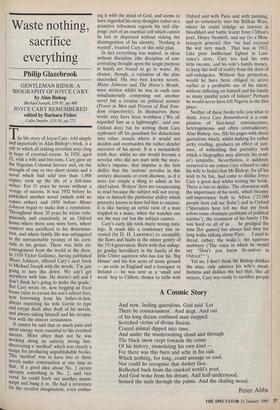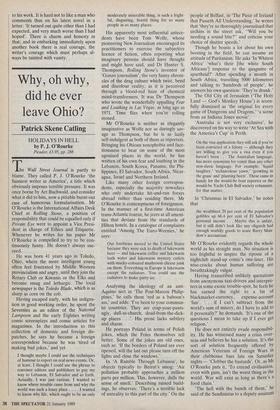Waste nothing, sacrifice everything
Philip Glazebrook
GENTLEMAN RIDER: A BIOGRAPHY OF JOYCE CARY by Alan Bishop
Michael Joseph, £19.95, pp.408
JOYCE CARY REMEMBERED edited by Barbara Fisher
Cohn Smythe, £19.50, pp.273
The life story of Joyce Cary, told simply and impartially in Alan Bishop's book, is a raft to which all sinking novelists may cling In hope of eventual rescue. In 1920, aged 32, with a wife and two sons, Cary gave up the Nigerian Colonial Service and, on the strength of one or two short stories and a novel which had sold less than 1,000 copies, took up the life of a full-time writer. For 11 years he wrote without a vestige of success. It was 1932 before he Published another novel (which sold no copies either) and 1939 before Mister Johnson began to make him a reputation. Throughout those 20 years he wrote volu- minously and ceaselessly in an Oxford house where more sons were born, where comfort was sacrificed to his determina- tion, and where family life was subjugated to the unreasonable tyranny of his certi- tude in his genius. There was little en- couragement from the world at the door. In 1939 Victor Gollancz, having published Mister Johnson, offered Cary's next book to Michael Joseph with the words, 'I'm just going to turn this down. We can't get anywhere with him. He doesn't sell and I don't think he's going to make the grade.' But Cary wrote on, now begging an Eton house tutor to excuse his son's school fees, now borrowing from his father-in-law, always expecting his wife Gertie to type and retype draft after draft of his novels, and always taking himself and his occupa- tion with the utmost seriousness.
It cannot be said that so much pain and Spent energy were essential to his eventual success. More often than not he was working along an entirely wrong line, discovering a 'method' which was clearly a recipe for producing unpublishable books. This 'method' was to have two or three novels under construction at one time so that, 'if a good idea about No. 1 occurs apropos something in No. 2, and vice versa' he could fetch out another manu- script and bung it in. He had a reverence for the creative imagination, even confus- ing it with the mind of God, and seems to have regarded his stray thoughts rather as a primitive tribesman regards his nail clip- pings: part of an essential self which cannot be lost or dispersed without risking the disintegration of his identity, 'Nothing is wasted', boasted Cary of this wild plan.
In fact everything was wasted, as ideas without discipline (the discipline of con- centrating thought upon the single purpose in hand) are bound to go to waste. By chance, though, a variation of the plan succeeded. His two best known novels, Mister Johnson and The Horse's Mouth, were written whilst he was in each case simultaneously composing not another novel but a treatise on political science (Power in Men and Process of Real Free- dom respectively). In themselves these works may have been worthless ('We all regarded him as a lightweight', said one Oxford don) but by writing them Cary syphoned off his penchant for didacticism into other vessels where it would not deaden and overburden the rather slender narrative of his novel. It is a melancholy truth that, whilst no one would become a novelist who did not start with the story- teller's impulse, that impulse is the first ability that the 'serious' novelist in this century discounts or even disowns, as if it were too simple a thing to admit as his chief talent. Writers' lives are exasperating to read because the subject will not recog- nise in himself the particular ability which posterity knows to have led him to success: it is like having an aerial view of a man trapped in a maze, when the watcher can see the way out but the subject cannot.
Cary's early life took many wrong turn- ings. It reads like a cautionary tale in- vented (by D. H. Lawrence) to exemplify the flaws and faults in the minor gentry of the 1914 generation. Born with that unhap- py grudge hereditary in the family of the little Ulster squireen who has lost his 'Big House' and his few acres of stony ground — an exile in England and a foreigner in Ireland — he was sent as a 'small and weak' boy to Clifton, thence to trifle with Oxford and with Paris and with painting, and so voluntarily into the Balkan Wars, where he could indulge an interest in bloodshed and battle learnt from Clifton's poet, Henry Newbolt, and say (to a Mon- tenegrin general) that 'we had enjoyed the war very much.' That was in 1913. Like poor ineffectual Egbert in Law- rence's story, Cary too had his own little income, and his wife's family money, to keep the wolf of reality from the door of self-indulgence. Without that protection, would he have been obliged to arrive earlier at a profitable use of his talent, without inflicting on himself and his family so many painful years of failure? Perhaps he would never have left Nigeria in the first place.
Neither of these books tells you what to think. Joyce Cary Remembered is a com- pilation of first-hand reminiscences, heterogeneous and often contradictory; Alan Bishop, too, fills his pages with direct quotations which, whilst making for rather jerky reading, produces an effect of just- ness, of witholding that partiality with which a biographer may alienate his read- er's sympathy. Nevertheless, it suddenly occurred to me (when Cary refused to take his wife to India) that Mr Bishop, for all his wish to be fair, had come to dislike Joyce Cary a good deal whilst writing the book. There is lots to dislike. The obsession with the importance of his work, which became self-importance both in Africa ('25,000 people here call me Baba') and in Oxford (`Specialists here tell me that my book solves some obstinate problems of political science'); the treatment of his family ('He was hard on all of us ... he grudged the time [for games] but always had time for long walks talking about Plato ... I used to dread, rather, the walks'); the squireen snobbery (The voice in which be would say "Don't you know So-and-so in Oxford?" '). Yet no, I don't think Mr Bishop dislikes the man; only admires his wife's stead- fastness and dislikes the fact that, like all writers, Cary was ready to sacrifice people to his work. It is hard not to like a man who comments thus on his latest novel in a letter: 'It turned out quite other than I had expected, and very much worse than I had hoped'. There is charm and honesty in that; and in embarking immediately upon another book there is real courage, the writer's courage which must perhaps al- ways be tainted with vanity.



























































 Previous page
Previous page